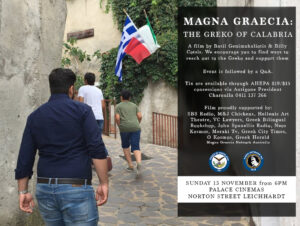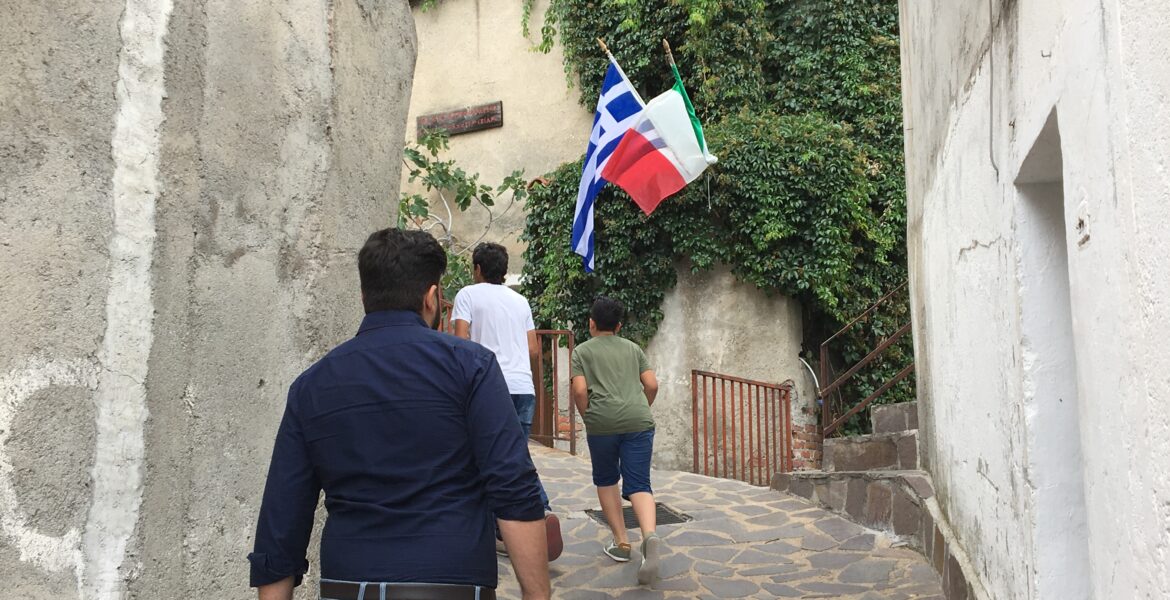AHEPA NSW INC’s Chapter Antigone and the Australian Hellenic Educators’ Association, in cooperation with filmmaker and author Billy Cotsis, present a special screening of his film Magna Graecia: the Greko of Calabria, the first in his three-part Magna Graecia series at the Palace Cinemas Norton Street Leichhardt on Sunday 13 November from 6pm.
Produced by Cotsis and Basil Genimahaliotis, Magna Graecia looks at the Greko communities of Calabria in the southernmost part of the Italian peninsula, a group of people who have maintained their millennia-old links to their ancient and medieval Hellenic past through their language and culture.
"My film Magna Graecia: the Greko of Calabria was shot on location across all the Greko towns, where one can find living, breathing ancient Greek statues! No one has ever done this type of film," Cotsis tell Greek City Times.
While the roots of the Hellenic presence in Calabria and neighbouring regions which now comprise southern Italy are lost in time, there were two main phases of migration from the Aegean Basin to these lands; the first during the 8th and 7th centuries BCE, and the second during the gradual Ottoman conquest of Hellenic lands to the east.
The last great wave of Hellenic migration into Calabria was in the 1400s, following the fall of the imperial capital of Constantinople. Tens of thousands of learned - and less so – Orthodox Christians fled Islamic rule for the nearest Christian territories: Calabria and adjoining regions. There they played key roles in what became known as the Renaissance, the ‘rebirth’ of ancient Hellenic and Roman learning.
Calabria was once dominated by Hellenism, where one could not move freely through the entire south of Italian Peninsula without being able to speak some form of the Hellenic language. At their peak, 1,500 Orthodox monasteries and churches adorned Calabria and its neighbours. The political unification of Italy in the 1800s and the imposition of the dialect of Tuscany as modern Italian accelerated the decline of this linguistic dominance.
Cotsis first visited the region in 2002 when he found the language still spoken in the homes and towns that he visited in southern Italy. He has been back a number of times, resulting in this 53-minute-long documentary takes the viewer to Greko-speaking villages.
"I have been to this region three times and I have visited 65 countries around the world to research and engage with Greek communities. This is self funded work.
"My intention is that people see the film and learn, all media attention will help the Greko - it’s the awareness of the Greko which is priceless," says Cotsis.
[su_custom_gallery source="media: 217424,217422,217426,217427,217428,217429,217421,217430,217431,217432" link="attachment" width="500" height="350" title="never"]"As the film as has a Greek meets Calabria theme, Norton Street was chosen as the venue," explains Cotsis.
"The film has already played at the Hellenica Festival in Adelaide, and in Melbourne at a packed house at the Pallaconian Brotherhood as well as various international film festivals. It will screen on Australian TV next year and we have also fielded enquiries from LA, Greece and Cyprus for TV broadcast."
The screening will be followed by a Q&A with Billy Cotsis, hosted by actress and Australian Calabrian Belinda Maree.

Magna Graecia: More Information
Sunday 13 November from 6pm.
Tickets are $19 for adults and $15 for concessions.
To reserve your seats, call Chapter Antigone President Charoulla on 0411 137 266 or [email protected]
Read also: The Legacy of the Greeks: Classical Greece and its Influence on Sydney


